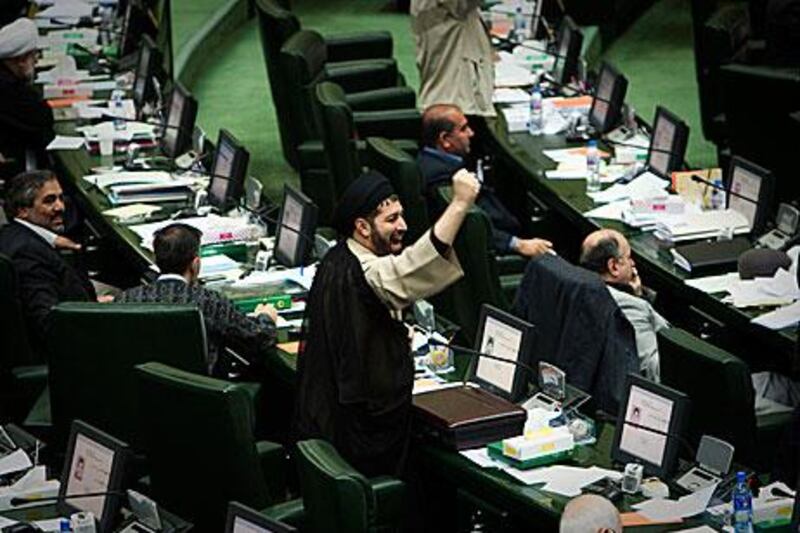Amid chants of "death to England", Iran's parliament voted by a large majority yesterday to expel the British ambassador just weeks after Dominick Chilcott took up his post.
A stage-managed protest against "evil" London's sanctions over Iran's nuclear programme is due today outside Britain's fortresslike embassy in central Tehran, the scene of sometimes violent anti-western demonstrations.
One parliamentarian warned that Iranians could storm the compound as they did the US embassy in 1979.
London infuriated Iranian politicians this month by sanctioning Iran's central bank, which Britain accused of helping to fund Iran's nuclear programme.
Tehran warned that other countries "behaving in a similar manner" would also be punished.
"This is only the beginning," Ali Larijani, the powerful parliamentary speaker, vowed.
The EU will consider this week a French call to go for Iran's economic jugular by banning Iranian oil exports. Britain called the move to expel Mr Chilcott "regrettable" and "unwarranted".
It would do "nothing to help the regime address their growing isolation or international concerns about their nuclear programme and human rights record," said a spokesman for the UK Foreign and Commonwealth Office.
"If the Iranian government acts on this we will respond robustly in consultation with our international partners," he added
The bill, which gives Mr Chilcott two weeks to pack his bags, must be approved by Iran's hardline Guardians Council.
This is likely to be a formality, according to analysts.
Tehran intends to scale down economic relations with Britain, which are already in decline, to a "minimum".
The bill was approved by 171 of the 196 parliamentarians present.
London and Tehran will still maintain diplomatic relations, although at the reduced level of charge d'affaires.
Several MPs wanted ties severed completely.
"We must place a lock on the British embassy and ignore them until they come begging like the Americans," said Mahmoud Ahmadi Bighash, an MP.
The US severed ties with Iran in 1980 after its embassy was seized by militant students who held 52 diplomats hostage for 444 days.
"The British government should know that if they insist on their evil stances, the Iranian people will punch them in the mouth, exactly as happened against America's den of spies," Mehdi Kuchakzadeh, an MP, said.
The effect of Mr Chilcott's expulsion will be mainly symbolic.
Until his arrival last month, Britain was represented at charge d'affaires level for several months by Jane Marriott, who is regarded as highly competent.
She will once more head the diplomatic mission if Mr Chilcott is forced to leave. Britain may find it hard to retaliate in kind against Iran, which has long chosen to be represented only at charge d'affaires level in London and so has no ambassador to expel.
Britain sanctioned Iran's central bank after a report by the UN's nuclear watchdog earlier this month strongly suggested that the Islamic republic had conducted research into nuclear weapons.
Tehran insists its nuclear programme is designed solely to generate electricity.
The US, which has spearheaded the drive for punitive measures against Iran, stopped short of sanctioning the country's central bank over fears about the potential effects on the oil market and the global economy.





